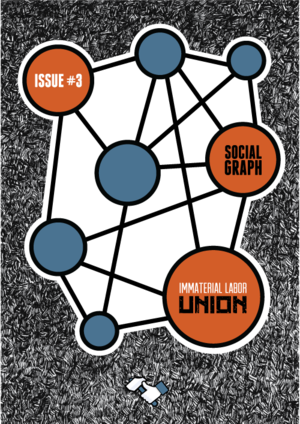Immaterial Labour Union: Difference between revisions
No edit summary |
No edit summary |
||
| Line 12: | Line 12: | ||
links of interest, nodding quiet acquiescence<br> | links of interest, nodding quiet acquiescence<br> | ||
how vastly superior is to profit from conscience | how vastly superior is to profit from conscience | ||
poet of algorithms,<br> | poet of algorithms,<br> | ||
engineer of souls,<br> | engineer of souls,<br> | ||
| Line 18: | Line 17: | ||
my desire composed in graphics pale. | my desire composed in graphics pale. | ||
|Catalog-Text3= Corporate Social Networking Plaftforms as Cognitive Factories: Labour Organisation in the Digital Space (An Excerpt) | |Catalog-Text3= Corporate Social Networking Plaftforms as Cognitive Factories: Labour Organisation in the Digital Space (An Excerpt) | ||
The expansion of the sociogram to non-human nodes opens up the question about | The expansion of the sociogram to non-human nodes opens up the question about | ||
the human subject - if social engineering explains the management of social relationships, how does one explain the management of the subject’s notion of self? In Governing the Soul: the Shaping of the Private Self, one of the general problems that Nicholas Rose proposes to address concerns the social shaping of the human subject. Social thinkers such as Karl Marx and Adam Smith reflected on the relationship between social context and its inhabitant subject; sociology and psychology were not separated entities; where these thinkers asked how human subjectivity was socially determined by the surrounding apparatus, Rose asks: “how have persons been shaped by prevailing ways of thinking about human beings and acting upon them?” (Rose, xvii). With the “birth of a new area of expertise” in the area of the psy sciences, Rose argues that it has become evident the tendency towards the engineering of the soul - never before was human subjectivity so carefully managed, so instrumental to the general economical efficiency of society.<br> | the human subject - if social engineering explains the management of social relationships, how does one explain the management of the subject’s notion of self? In Governing the Soul: the Shaping of the Private Self, one of the general problems that Nicholas Rose proposes to address concerns the social shaping of the human subject. Social thinkers such as Karl Marx and Adam Smith reflected on the relationship between social context and its inhabitant subject; sociology and psychology were not separated entities; where these thinkers asked how human subjectivity was socially determined by the surrounding apparatus, Rose asks: “how have persons been shaped by prevailing ways of thinking about human beings and acting upon them?” (Rose, xvii). With the “birth of a new area of expertise” in the area of the psy sciences, Rose argues that it has become evident the tendency towards the engineering of the soul - never before was human subjectivity so carefully managed, so instrumental to the general economical efficiency of society.<br> | ||
| Line 29: | Line 27: | ||
Every two weeks, The Immaterial Labour Union issues a new number of its zine. Each number touches on a different aspect of corporate social media labor, such as terms of service, advertisement, the social graph, tracking cookies, etc. Through satire, poetry, creative experimentation with image and text, academic theory and practical tools for self-empowerment on social networks, the zine intends to be a portal to broader audience engagement, an active campaigning tool to activate participation and conception of alternatives. | Every two weeks, The Immaterial Labour Union issues a new number of its zine. Each number touches on a different aspect of corporate social media labor, such as terms of service, advertisement, the social graph, tracking cookies, etc. Through satire, poetry, creative experimentation with image and text, academic theory and practical tools for self-empowerment on social networks, the zine intends to be a portal to broader audience engagement, an active campaigning tool to activate participation and conception of alternatives. | ||
}} | }} | ||
Revision as of 11:37, 12 June 2015
| Immaterial Labour Union | |
|---|---|
| Creator | Lídia Pereira |
| Year | 2015 |
| Bio | After completion of her bachelor studies in Graphic Design, Lídia Pereira [PT] became intrigued by the friction between digital utopias and material realities. Her current work is concerned with the political organization of labour within digital economy, presenting a focus on the power structures governing online behaviour. |
| Thumbnail | |
| Website | http://www.immateriallaborunion.net/ |
The Immaterial Labor Union was born out of a desire to negotiate terms of service and push for the protection of personal data on a transnational scope, against avid, corporate social networking companies profiting from user-generated content. The Union aims, in the short-term, to readdress abuses concerning the unfair working conditions perpetrated through the processing of our online data, and in a long-term to conceive and shape alternative social networking solutions.
Every two weeks, The Immaterial Labour Union issues a new number of its zine. Each number touches on a different aspect of corporate social media labor, such as terms of service, advertisement, the social graph, tracking cookies, etc. Through satire, poetry, creative experimentation with image and text, academic theory and practical tools for self-empowerment on social networks, the zine intends to be a portal to broader audience engagement, an active campaigning tool to activate participation and conception of alternatives.




